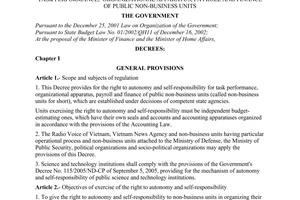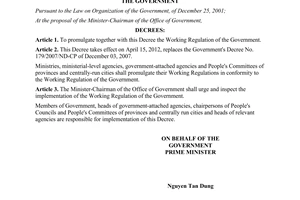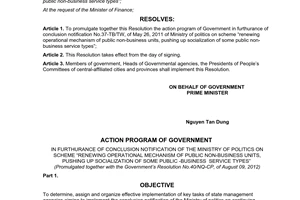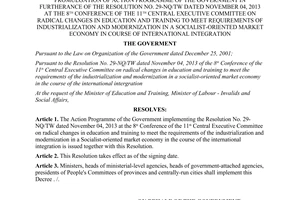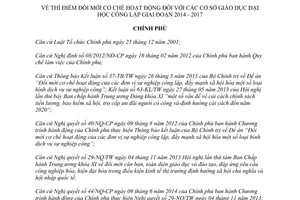Nội dung toàn văn Resolution No. 77/NQ-CP 2014 renovation of public tertiary education institutions 2014 2017
|
THE GOVERNMENT |
THE SOCIALIST REPUBLIC OF VIETNAM |
|
No. 77/NQ-CP |
Hanoi, October 24, 2014 |
RESOLUTION
ON PILOT RENOVATION OF THE OPERATION MECHANISM OF PUBLIC TERTIARY EDUCATION INSTITUTIONS DURING 2014-2017
THE GOVERNMENT
Pursuant to the December 25, 2001 Law on Organization of the Government;
Pursuant to the Government’s Decree No. 08/2012/ND-CP of February 16, 2012, promulgating the Government’s Working Regulation;
Pursuant to the Political Bureau’s Conclusion Notice No. 37-TB/TW of May 26, 2011, on the Scheme on renovation of the operation mechanism of public non-business units and acceleration of the socialization of a number of public non-business services; and Conclusion No. 63-KL/TW of May 27, 2013, of the 7th Plenum of the Communist Party of Vietnam Central Committee (the XIth Congress), on a number of issues on the reform of salary and social insurance policies and preferential allowances for people with meritorious services to the nation and reform orientations toward 2020;
Pursuant to the Government’s Resolution No. 40/NQ-CP of August 9, 2012, promulgating the Government’s Program of Action to implement the Political Bureau’s Conclusion Notice on the Scheme on renovation of the operation mechanism of public non-business units and acceleration of the socialization of a number of public non-business services;
Pursuant to Resolution No. 29-NQ/TW of November 4, 2013, of the 8th Plenum of the Communist Party of Vietnam Central Committee (the XIth Congress), on fundamental and comprehensive renovation of education and training to meet the requirements of industrialization and modernization under the conditions of the socialist-oriented market economy and international integration;
Pursuant to the Government’s Resolution No. 44/NQ-CP of June 9, 2014, promulgating the Government’s Program of Action to implement Resolution No. 29-NQ/TW of November 4, 2013;
In order to encourage public tertiary educational institutions to actively tap and reasonably and effectively utilize resources to improve the quality of tertiary education, reduce state budget expenditure without limiting opportunities to access tertiary education for poor students and students being social policy beneficiaries, and based on the Scheme on pilot renovation of the operation mechanism during 2014-2017 applicable to 4 universities of the Ministry of Education and Training,
RESOLVES:
Article 1. A public tertiary education institution, when committing to covering all expenses for its regular operation and investment, may enjoy autonomy and take comprehensive accountability, specifically as follows:
1. Regarding the performance of training and scientific research tasks
a/ To open training disciplines and specialties to meet the needs of the society when fully satisfying conditions prescribed by law; to determine enrollment quotas under regulations and organize enrollment, ensuring publicity and transparency;
b/ To decide on training activities (training programs; teaching methods; methods of examination and testing to assess learning results; teaching courses, learning materials and management of training; printing, issuance and management of diplomas and certificates); to ensure the standards of graduate quality and carry out quality inspection under regulations;
c/ To decide on the training cooperation with domestic and foreign education institutions on the basis of accredited joint training programs. The joint training quota is the part of the total training quotas determined by the institution itself under regulations;
d/ To decide on research orientations; to encourage the commercialization of scientific research results; to decide on participation in scientific and technological tasks and services and organization of seminars in coordination with domestic and foreign organizations and individuals; to decide on the use of its assets, physical foundations and brand value for entering into joint ventures or associations for carrying out scientific and technological activities, and organize the provision of services compatible with its professional fields;
dd/ To provide public non-business services under orders placed by the State.
2. Regarding organizational apparatus and personnel
a/ To decide on the establishment, merger, division, split-up and dissolution, and define the functions, tasks and operational regulations of, its attached units;
b/ To decide on the structure and number of its employees; to recruit public employees and contractual staff members after obtaining approval of its council; to sign working and labor contracts, manage, use and terminate such contracts in accordance with law;
c/ To sign labor contracts with foreign lecturers and scientists to meet the needs of teaching and scientific research.
3. Regarding finance
a/ Tuition fees:
- To decide on the average tuition fee rate (for a general program) not exceeding the ceiling tuition fee rate prescribed by the State plus regular state budget spending for each student nationwide;
- To decide on a specific tuition fee rate (higher or lower than the average tuition fee rate) for each training discipline, specialty or program to meet the needs of learners and ensure training quality, ensuring that the average tuition fee rate does not exceed the above maximum average tuition fee rate; to publicize tuition fee rates among learners before organizing the enrollment.
b/ Non-business revenues:
To specify and publicize non-business revenues other than tuition fees on the principle that they can cover expenses and make reasonable accumulations.
c/ Salaries and incomes:
To decide on additional incomes for its employees under its internal spending regulation, in addition to rank- and grade-based salaries as prescribed by the State.
d/ Use of revenues:
- To decide on the use of its revenues for regular activities, ensuring the committed standards of graduate quality. A positive difference between revenues and expenses may be set aside to the following funds: the fund for the development of non-business activities; the award fund; the welfare fund; the fund for income stabilization and student assistance funds. At least 25% of such difference must be set aside to the fund for development of non-business activities. The rates of setting aside to the remaining funds and payment of additional incomes shall be decided by the principal under its internal spending regulation.
- Collected tuition fees and other non-business revenues shall be deposited at commercial banks.
4. Regarding policies on scholarships and tuition fees for social policy beneficiaries
a/ The enjoyment of autonomy by universities must maintain opportunities to access tertiary education for poor students and students being social policy beneficiaries;
b/ An autonomous university shall formulate and implement the following policies on:
- Grant of scholarships to excellent students and students being social policy beneficiaries;
- Exemption from and reduction of tuition fees for poor students and students being social policy beneficiaries and provision of support to cover the difference between the State support rate and its tuition fee rate;
- Arrangement of dormitories for poor students and students being social policy beneficiaries, and exemption for and reduction of dormitory rental; and other policies based on each university’s conditions.
c/ All interests on tuition fees and other non-business revenues deposited at commercial banks shall be channeled to student assistance funds;
d/ The State shall increase preferential loans for students of universities enjoying autonomy.
5. Investment and purchase:
a/ The State continues allocating state budget funds to complete on-going projects;
b/ To decide on investment projects funded by legitimate revenues and other lawful sources mobilized by the institution itself; to carry out procedures prescribed by the investment law; the State adopts interest support policies for loan-funded investment projects;
c/ To adhere to the principle of competition in bidding and the mechanism of placement of orders for state budget expenses for performance of scientific and technological development tasks and other tasks at the request of the State;
d/ To decide on and take responsibility for investment and purchase projects funded by the unit’s lawful sources.
6. Public tertiary education institutions shall exercise other autonomy contents under relevant regulations in addition to this Resolution.
Article 2. Responsibilities of public tertiary education institutions
1. To commit to ensuring training quality; to preserve and develop State-assigned capital and assets; perform other contents of autonomy in accordance with law; and to conduct audit under regulations.
2. To build their internal spending regulations, ensuring publicity and transparency.
3. To consolidate their organization, improve the effectiveness of their school boards’ activities, ensuring the supervision of all their activities.
4. To adopt mechanisms to facilitate the participation of their cadres, lecturers, employees, students and social organizations in the supervision of their activities.
5. To formulate, based on this Resolution and relevant regulations, a scheme on renovation of the operation mechanism and submit it to the Prime Minister for consideration and decision. Such a scheme must comply with Articles 1 and 2 of this Resolution.
Article 3. Public tertiary education institutions that do not enjoy pilot autonomy under this Resolution shall comply with the Government’s Decree No. 43/2006/ND-CP of April 25, 2006, providing the autonomy and accountability for task performance, organizational apparatus, payroll and finance of public non-business units.
Article 4. Ministries, ministerial-level agencies, government-attached agencies and provincial-level People’s Committees that perform the state management of public tertiary education institutions shall implement this Resolution in the spirit of respect for such institutions’ right to autonomy and accountability, concentrating on the following tasks:
1. The Ministry of Education and Training shall:
a/ Assume the prime responsibility for examining and inspecting the implementation of this Resolution; strictly handle violations; and in the fourth quarter every year summarize and report to the Prime Minister on the implementation of this Resolution;
b/ Organize the final review of pilot renovation of the operation mechanism for public tertiary education institutions during 2014-2017.
2. The Ministry of Finance shall:
a/ Assume the prime responsibility for revising preferential credit policies for pupils and students; provide interest supports for loan-funded investment projects;
b/ Coordinate with ministries and agencies managing public tertiary education institutions in examining the exercise of the financial autonomy and the management and use of capital and assets.
3. The Ministry of Home Affairs shall coordinate with ministries and agencies managing public tertiary education institutions in examining the exercise of the autonomy in organizational apparatus and salary regime.
4. The Ministry of Information and Communications shall direct press agencies in carrying out communication and dissemination among population in order to create a social consensus in implementing this Resolution.
5. Ministries, agencies and provincial-level People’s Committees shall thoroughly grasp this Resolution, direct and examine public tertiary education institutions in their localities in implementing this Resolution.
6. Provincial-level People’s Committees shall create favorable conditions in land and site clearance for public tertiary education institutions in their localities.-
|
|
ON BEHALF OF THE GOVERNMENT |

